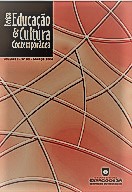Who benefits from Western forms of education? Unveiling "epistemological blindness" in language teacher education/Quem beneficia dos modos de educação ocidentais? Desocultando a "cegueira epistemológica" na formação de professores de língua
Resumen
Abstract The text analyses the impact of current educational policies on schooling and teacher education practices in Portugal with a focus on bilingual/ bicultural students. Building on selected key-concepts and themes that traverse the work of critical analysts, including the concept of "epistemological blindness", the text seeks to analyse how the techno-rational epistemologies underlie the subtractive forms of education that are imposed on bilingual/bicultural students in Portugal. The narratives of both beginning and experienced language teachers, on teacher education programs at the University of Minho, will be used to show how Western, Eurocentric epistemologies and "epistemological blindness" work in schools to undermine progressive and inclusive education for bilingual/ bicultural children. Their narratives on their experiences and on how they resonate with critical texts on schooling will be analysed, highlighting the difficulties and dilemmas these teachers experience that can be attributed to the disempowering forms of education these students are subjected to and that are seldom questioned. The education of bilingual/bicultural students in Portugal is located on the other side of the epistemic abyss that Boaventura Sousa Santos identifies in modern Western Eurocentric rationality. The naturalization of their invisibility in Portuguese schools and the absence of a critical multicultural teacher education programs are very much justified by the prevailing curriculum and teacher education policies and practices, but also by the "teaching to the test" classroom practices that disempower both students and teachers. Resumo O texto analisa o impacto das políticas educativas atuais na escolarização e formação de professores em Portugal, focando o caso dos estudantes bilingues/ biculturais. A partir de conceitos-chave e temas oriundos do trabalho de analistas críticos e que incluem o conceito de "cegueira epistemológica" o artigo procura analisar o modo como as epistemologias tecnicistas subjazem às formas de educação subtractiva à qual os estudantes bilingues/ biculturais são sujeitos. As narrativas de professores principiantes e experientes serão usadas para evidenciar o modo como as epistemologias Ocidentais e Eurocêntricas, e a "cegueira epistemológica" funciona nas escolas para minar uma educação progressista e inclusiva para os estudantes bilingues/ biculturais. As narrativas da experiência e o modo como encontram ecos nos textos críticos sobre a escolarização serão objeto de análise, evidenciando as dificuldades e dilemas que estes professores experienciam e que podem ser atribuídos aos modos excludentes de educação aos quais estes estudantes são submetidos e que raramente são problematizados. A educação dos estudantes bilingues/ biculturais em Portugal encontra-se no outro lado do abismo epistémico que Boaventura Sousa Santos identifica na racionalidade Ocidental e Eurocêntrica moderna. A naturalização da sua invisibilidade nas escolas portuguesas e a ausência de uma educação multicultural crítica são justificadas em larga medida pelas políticas e práticas de curriculares e de formação de professores, mas também pelas práticas de avaliação das aprendizagens orientadas para e pelos testes que atuam no sentido de oprimir, quer o trabalho docente quer as aprendizagens dos estudantes.Descargas
Publicado
Número
Sección
Licencia
Ao submeter um artigo para publicação na Revista Educação e Cultura Contemporânea, o (s) autor(es) concordam com os seguintes termos:
I. O(s) autor(es) e o(s) eventual(is) coautor(es) conhecem e declaram concordar com as políticas editoriais da revista para a publicação de artigos e com os termos e diretrizes a seguir;
II. Os autores garantem que o trabalho não foi publicado anteriormente em meio eletrônico ou impresso, tampouco encaminhado para publicação em língua portuguesa em outros periódicos. Também asseguram que todos os autores participaram na elaboração intelectual de seu conteúdo;
III. Os artigos publicados representam, exclusivamente, a expressão do ponto de vista de seus autores e não a posição da Revista Educação e Cultura Contemporânea ou do Programa de Pós-Graduação em Educação da Universidade Estácio de Sá;
IV. É responsabilidade do(s) autor(es) assegurar que o manuscrito não contenha elementos que revelem sua identidade, garantindo a revisão cega durante o processo de avaliação por pares. Para isso, devem ser adotadas as seguintes medidas: remover nomes de autores, afiliações institucionais e quaisquer informações pessoais do corpo do texto e das notas de rodapé; substituir referências à própria produção por termos neutros, como “Autor(a)” ou “Autor(a), ano”, evitando citações que permitam a identificação; nomear o arquivo de submissão de forma neutra, sem mencionar o nome do(s) autor(es); e excluir metadados do documento que possam identificar a autoria (ex.: propriedades do arquivo em editores de texto).
V. O responsável pela submissão deve certificar-se do preenchimento completo e correto das informações de todos os colaboradores, conforme solicitado no sistema de submissão, incluindo: nome completo, filiação institucional atualizada, e-mail, link para o currículo Lattes (para participantes brasileiros), ORCID e minicurrículo;
VI. O(s) autor(es) comprometem-se a submeter o manuscrito utilizando exclusivamente o template oficial disponibilizado pela Revista Educação e Cultura Contemporânea (REEDUC), assegurando o cumprimento integral das normas de formatação exigidas. Isso inclui a padronização de margens, fonte, espaçamento, estilo de citações e referências bibliográficas, conforme descrito nas Diretrizes para Autores. Submissões fora do padrão estabelecido poderão ser rejeitadas ou devolvidas para ajustes antes do encaminhamento à avaliação por pares.
VII. Caso tenha sido utilizado algum recurso de inteligência artificial (IA) durante a elaboração do manuscrito, o(s) autor(es) deve(m) declarar esse uso, seguindo as orientações do template e da seção "Declaração de Direito Autoral", disponíveis nesta página.





